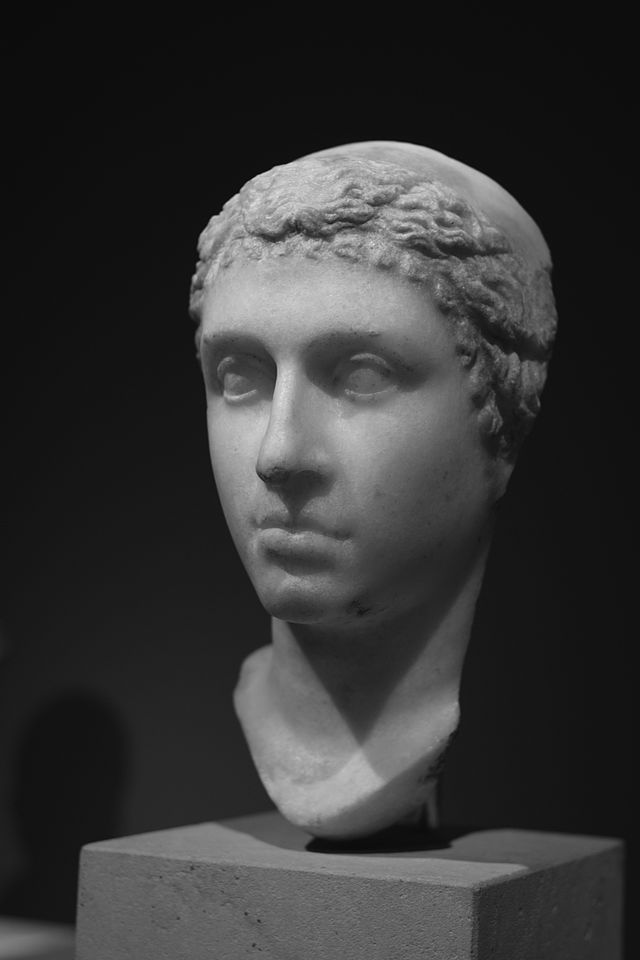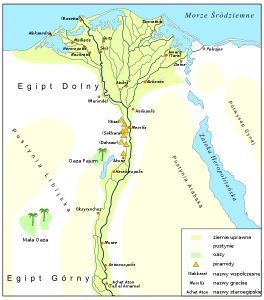To recap last week: Alexandria was an awesome place, Cleopatra as a child was smart and capable, but the Ptolemies didn’t get along. At all. Her father, Auletes, was deposed because he was too much under Rome’s thumb. Her sister took over, but the Romans (after much bribery by Auletes) said: no, really, Auletes is in charge, and here’s our army to back up our words. Auletes rules for a few more years, with some evidence that Cleopatra was his co-ruler for the last year of his life.
Auletes died in 51 BCE. He left Egypt to Cleopatra (18 years old) and her brother, Ptolemy XIII (13 years old), in his will. They co-ruled for a bit. Which really means that Cleopatra did what she could to sideline Ptolemy. Ergo, Ptolemy’s advisors schemed to get rid of Cleopatra – she was too independent from them and he was more malleable. (The History of Rome, ep 44) She also takes part in religious festivals – an important part of being an Egyptian ruler. (The History of Rome, ep 44) Since they couldn’t control her, they wanted her gone. She was banished.

Back in Rome, they’re having their own civil war. Julius Caesar is fighting Pompey Magnus for control of the Roman Republic, which, remember, basically controls all the land around Egypt and is breathing heavily down Egypt’s neck. In the course of said war, Pompey is fleeing Caesar’s army. He aims for Egypt because they’ve been nice to him in the past. But not this time.
Ptolemy and his advisors know that without Rome’s blessing, their government isn’t long for this world. Seeing that Caesar has the upper hand at this point, Ptolemy and his advisors behead Pompey as he comes ashore in September of 48 BCE. Caesar follows shortly thereafter, and is appalled when Pompey’s head is presented to him. Ptolemy and his advisors have misjudged the situation. Caesar takes over a portion of the royal palace. (Cleopatra, p14)
Cleopatra has been raising armies in Syria. (Cleopatra, p11) She’s persona non grata in the Egyptian palace, and both she and Ptolemy have armies ready to fight. But she sees an opportunity: Caesar can help her. He’s not inclined to like Ptolemy, since he and his advisors killed Pompey (The History of Rome, ep 44).
Ptolemy asks Caesar to leave, he refuses because he needs Egyptian money. Egypt still owes 6000 talents to Rome, promised by Auletes, so this isn’t conquer and pillage per se. (Cleopatra, p39) Caesar (age 52) asks Cleopatra (now 21) to come to the palace. (The History of Rome, ep 44) Note that it’s also in Rome’s interest to have a stable Egypt. Caesar wants a stable client kingdom that will pay up in either gold or grain as needed. (Cleopatra, p14)
She smuggles herself into the palace, probably in a bag typically used for carpets. She isn’t particularly lovely by modern standard, but she was smart and charming. “Generally, it was known to be impossible to converse with her without being instantly captivated by her.” (Cleopatra, p16) She impresses Caesar, who also reportedly likes her flair. Ptolemy discovers Cleopatra and Caesar together and freaks out. (Cleopatra, p40)
Caesar and his troops take over the palace, placing Ptolemy under house arrest and protecting Cleopatra. Unfortunately for Cleopatra, the Alexandrians are on Ptolemy’s side, and his advisors claim that the Romans are trying to turn Egypt into a province. (The History of Rome, ep 44) The Egyptians were grumpy about Auletes being in Rome’s pocket and now Cleopatra is in Rome’s bed. Ptolemy ostensibly agrees to a reconciliation, but his advisors are raising troops at the same time. (Cleopatra, p43) Caesar eventually manages to calm the Alexandrians down somewhat by returning Crete. (Cleopatra, p44)
Caesar is protecting Cleopatra, but they’re all prisoners in the Royal Palace. There was a lot of street fighting in Alexandria – by this time one of Ptolemy’s advisors has troops in the city (Cleopatra, p45). The Roman legions were tougher, but they didn’t have urban warfare tactics. (The History of Rome, ep 44)
In January of 47 BCE (if my calculations are correct), a delegation heads to the palace to secure Ptolemy’s release. It works, and it’s unclear exactly why. Certainly Caesar’s typical leniency plays into it. (Cleopatra, p 61) Ptolemy, of course, heads straight for his armies.
Shortly thereafter, Ptolemy’s and Caesar’s forces meet in the Battle of the Nile. Caesar wins easily. Ptolemy dies when his boat capsizes. (The History of Rome, ep 44) The Alexandrians throw down their weapons. (Cleopatra, p 62) Cleopatra is ruler, albeit with her even younger brother Ptolemy XIV, but he’s a puppet. Cleopatra and Caesar are firmly in control. So they take a trip down the Nile to show off her power and glamour to her people, but also: vacation.
Next week: Cleopatra is pregnant with Caesar’s only son at the end of the Nile trip. He heads back to Rome to consolidate his power. Long-distance romance!


